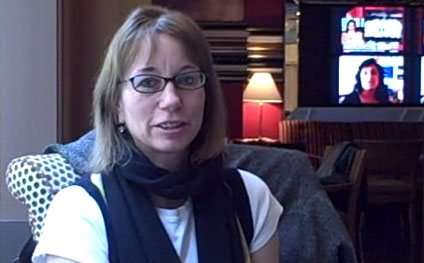Literary Crosstraining With Laura Lippman

“Last year was insane, and I still feel like I’m trying to catch up,” Laura Lippman tells me as we chat in a café next to the offices of HarperCollins, which has published her novels under the William Morrow imprint for the last 15 years. In addition to writing Life Sentences, a stand-alone novel about a bestselling memoirist whose research into a criminal case involving one of her former classmates digs up all sorts of unsettling information, Lippman also agreed to write a 15-chapter serialized novella starring Tess Monaghan, the reporter-turned-private-eye Lippman introduced in her debut novel, 1997’s Baltimore Blues, and has stayed with for several sequels—interspersed with stand-alone novels, to be sure, but never in such a compressed time frame. (And that’s not even counting the short story collection, Hardly Knew Her, that came out last fall.)
When she was invited by the New York Times Sunday Magazine to write a serial, she sought the advice of two writer friends, Michael Connelly and Ian Rankin, who had previously taken part in the project: “I was hoping to be told it was okay to blow it off,” she laughs, but they assured her she really ought to take the paper up on the offer. So, although she doesn’t usually work from an outline, in order to make the serial fit into her schedule, she worked out the overarching narrative for 11 of the 15 chapters—but, to keep things surprising for herself, she decided each chapter would have its own mini-story…which she’d only discover while she was writing. She does, however, confess to slightly “cheating” on the serial format, in that she wrote the entire novella in advance, rather than on a week-by-week deadline. “I’m just too fond of revision,” she says.
“Life Sentences is one of the toughest books I’ve written,” Lippman added. “There were some really depressing days during the final draft.” She’s worked with the same editor, Carrie Ferron, since Baltimore Blues, and describes Ferron’s guidance as Socratic: “Carrie will tell me something is needed, but she won’t tell me the solution… For this novel, I took all the memoir sections [written in Cassandra’s voice] and put them in one document, and it came to 14,000 words. That was way too much.” She edited the material down by nearly half—6,000 words gone by the time she was through— “It was hard, but it was absolutely the essential thing to do. I’m always trying to acheive that feeling you get when every single word on the page absolutely has to be there, that it had been weighed and tried and earned its keep—and, sure, there’s plenty of times when that didn’t happen, but I still keep trying.”
Despite the extra workload, though, Lippman doesn’t mind the split in her writing energies. “Both strands of my career have nourished each other,” she reflected. “It’s like a form of literary cross-training. If I weren’t writing the lighter books with Tess between the stand-alones, I think my choice would be not writing at all.” On the other hand, she’s decided to plunge right into another stand-alone novel: “I’ve decided to give Tess a year off. I don’t think it’s the least bit accidental that I’ve decided to write a book this year about a happy person.” Obviously, she doesn’t want to get too much into the story, but she allowed as that it would explore what a person will do to protect their happy life. It’s a much difference experience, she concedes, than spending a year inside the head of Cassandra Fallows, the main character in Life Sentences. “I’m not really driven to memoirs of dysfunction,” she says; her tastes run more towards Calvin Trillin, Eudora Welty, and Bill Bryson.
Don’t read too much into the protagonist of Life Sentences being a best-selling author, by the way: “It was only when the book was finished that I thought seriously about the fact that I’d never written about a writer before,” Lippman says. “In my head, I was writing about someone who was much more of a star than I am.” Lippman concedes that she’s been successful, but points out that she knows other writers who’ve achieved fame “way beyond” her own: “When you’re a writer, from the inside, you see a lot more hierarchy, even if most other people won’t see the distinction.”
23 March 2009 | interviews |

 Our Endless and Proper Work is my new book with Belt Publishing about starting (and sticking to) a productive writing practice.
Our Endless and Proper Work is my new book with Belt Publishing about starting (and sticking to) a productive writing practice. 
